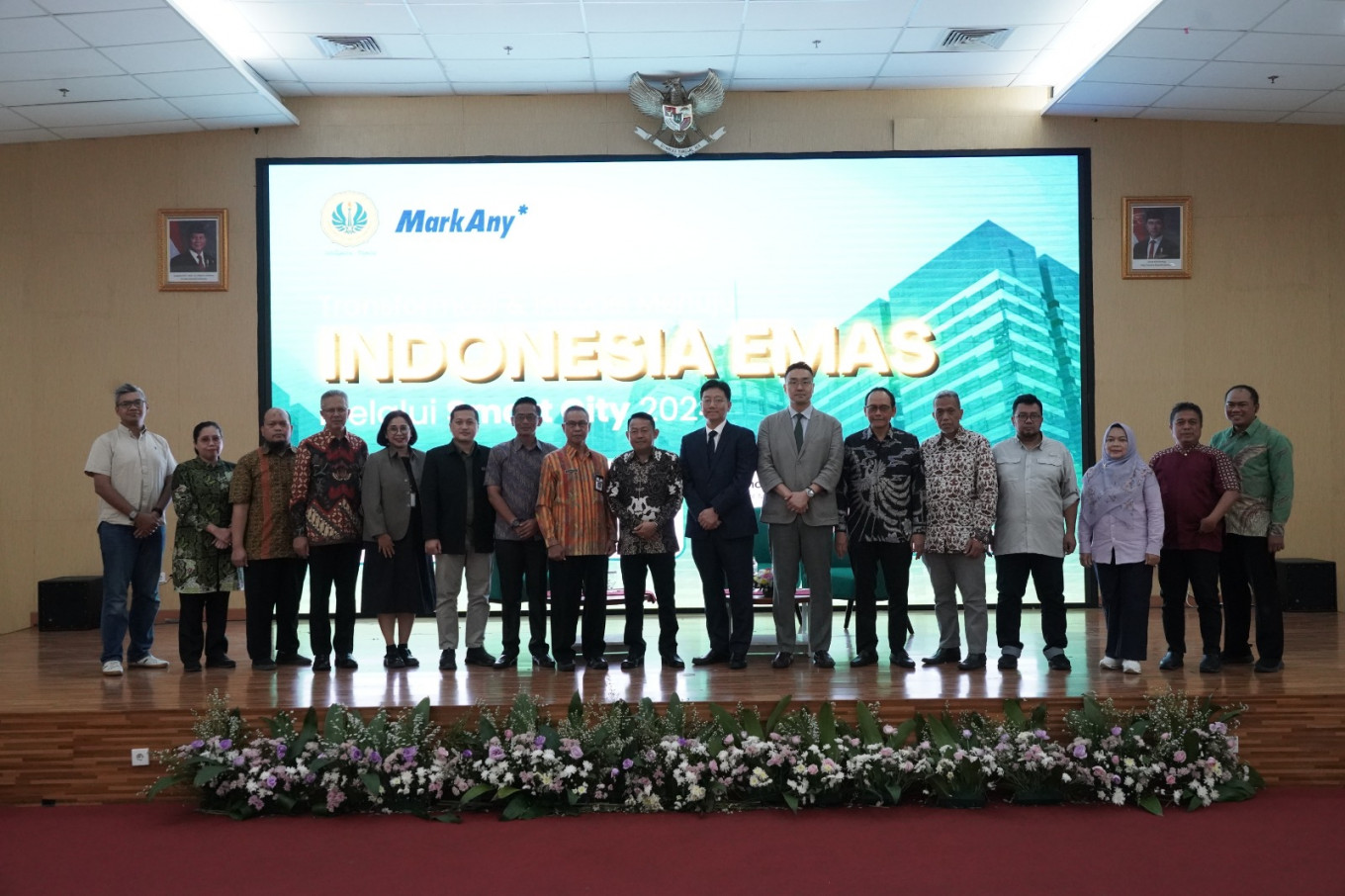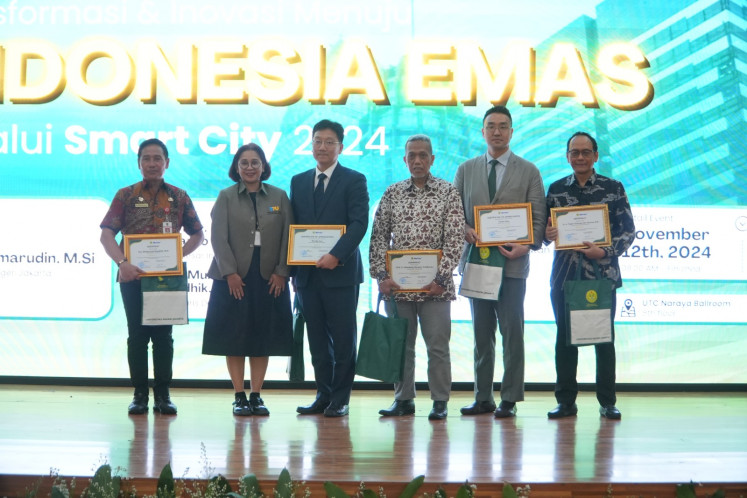Popular Reads
Top Results
Can't find what you're looking for?
View all search resultsPopular Reads
Top Results
Can't find what you're looking for?
View all search resultsBPU UNJ collaborates with PT MarkAny and Semarang administration to develop smart city
Change text size
Gift Premium Articles
to Anyone
T
he Business Management Agency of Universitas Negeri Jakarta (BPU UNJ), in collaboration with PT MarkAny and the Semarang city administration held a seminar with the theme “Transformation and Innovation Toward Golden Indonesia Through Smart City 2024”. This seminar aimed to develop the Smart City concept as a means of supporting city governance in the Jabodetabek areas with various facilities such as Smart Governance, Smart Branding, Smart Economy, Smart Living, Smart Society and Smart Environment.
The Smart City Seminar was held on Nov. 12, at the ballroom of the Naraya Hotel. The event was attended by Taeho Kim, director of MarkAny; Wonha Lee, executive director of MarkAny; Mukhamad Khadhik, regional secretary of Semarang city; Bambang Riyanto Trilaksono, professor of the Bandung Institute of Technology; Kusmayadi, secretary of the Regional Research and Innovation Agency; Wahyudi, head of the Innovation and Technology Division; Arif Budiman, head of the e-Government Services Division of Semarang city Communications and Statistics Office; and the mayors of Jabodetabek or their representatives.
Vice rector for research, innovation, and information systems, Fahrurrozi, in his speech said the seminar was very important because many developed cities around the world have implemented the Smart City concept. A Smart City is a city that uses information and communication technology in its management. Through good cooperation among MarkAny, BPU UNJ and the Semarang city administration, this program can be successfully carried out. Semarang city has been selected as a Smart City trial, and it is hoped that Jakarta can also become a trial city to make it possible to advance and develop like other big cities in the world. Fahrurrozi hoped that the cooperation between UNJ and MarkAny would run well. There would be a further discussion at 2 p.m. that day to discuss about the UNJ's digital-based legal documentation with MarkAny.
Prior to acting as a moderator, Teguh Trianung Joko Susanto, the initiator of the Smart City program, said that MarkAny previously won a research competition in Korea. It furthermore had the opportunity to conduct research in several other countries related to the empowerment of CCTV infrastructure in cities. UNJ and MarkAny conducted collaborative research in Semarang city because of its proximity to Jakarta and transparency to be in line with the goal of promoting accuracy.
Taeho Kim, director of MarkAny and the keynote speaker, said in his presentation that MarkAny was founded in 1999 and is headquartered in Seoul, South Korea. The company has more than 200 employees, 80 percent engineers. Its products include DRM-based security, mobile security and anti-counterfeiting AI-powered CCTV. MarkAny has embraced more than 4,000 clients spread over such sectors as government, and public and private companies in France. In addition, it holds more than 400 intellectual property rights. MarkAny has a mission of “Build a Safer World, Protect What Matters” serving business fields that include end-point security and compliance, anti-forgery and verification, and AI video security and privacy protection.
One of its products, the Video Surveillance System, has won several awards for its AI, one of which was Leaders of AI. This system provides an S/W control center, has an intelligent CCTV surveillance certification, and is the first to develop a video export system in Korea. The AI Video Surveillance System has several features, among which are different AI analytical models, application of deep learning techniques, optimized object/behavioral analysis, integrated processing platform, location-based object tracking of an event, open API integration for solution and connection, VMS independent triage system and operations support systems.
In his presentation, Taeho Kim also explained case studies in the use of this system in crowd management, tracking system for missing persons, fire detection, license plate recognition and intrusion detection.
Bambang Riyanto Trilaksono on the same occasion delivered material entitled "AI for Computer Vision: Current State of Research and Development", which discussed the definition of AI, analogies of AI with the human sensory system, brain and motor systems, reasons for the rapid development of AI, evolution of AI, analogies with human vision systems, computer vision, neuron models and artificial neural networks, AI applications for Computer Vision, facial and handwriting recognition and verification, visual Q&A, vehicle classification, Smart CCTV and so on.
Meanwhile, Mukhamad Khadhik revealed the Smart City program that the Semarang city administration has implemented in which it is working to bring forth smart public services. Semarang city administration has been attempting to establish a Smart City by signing an MoU with PT. Telkom, building free WiFi infrastructure, launching 148 SPBE systems and applications, committing to Smart Government in all OPDs, collaborating across OPDs in the SPBE system and application, realizing a 24-hour service system, developing a smart city with 1,000 CCTVs, developing big data CCTV analytics, accelerating one data and big data analytics, and developing Smart Society 5.0 and advanced AI CCTV. The implementation of the Smart City in Semarang includes Smart Governance, Smart Economy, Smart Environment, Smart Branding, Smart Living and Smart Society.
This seminar program was successfully organized by BPU UNJ in collaboration with MarkAny and the Semarang city administration. When met directly, Widya Parimita, head of BPU UNJ, stated that the change in UNJ's status to PTNBH would encourage BPU to continue to develop various business lines, and one currently being developed is event organizer, an organizer of seminars and other events.











